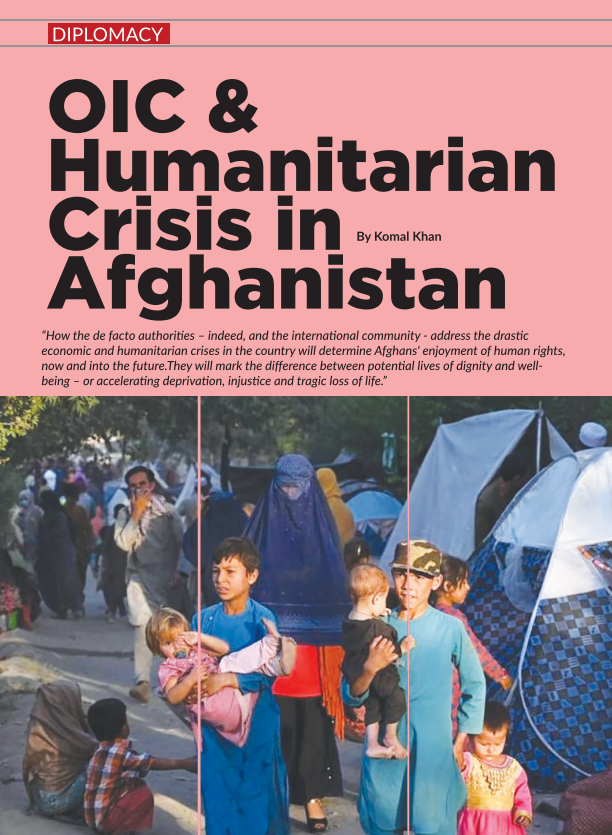
By Komal Khan
“How the de facto authorities – indeed, and the international community – address the drastic economic and humanitarian crises in the country will determine Afghans’ enjoyment of human rights, now and into the future.They will mark the difference between potential lives of dignity and well-being – or accelerating deprivation, injustice and tragic loss of life.”
The security situation in Afghanistan is alarming. This is evident from the remarks of the UN envoy for Afghanistan, Deborah Lyons, who portrayed Afghanistan as “on the brink of a humanitarian catastrophe” because about 60 per cent of Afghanistan’s 38 million population is suffering extreme hunger.
While briefing the Human Rights Council of the United Nations, the UN Deputy High Commissioner for Human Rights Nada Al-Nashif analyses that “How the de facto authorities – indeed, and the international community – address the drastic economic and humanitarian crises in the country will determine Afghans’ enjoyment of human rights, now and into the future.They will mark the difference between potential lives of dignity and well-being – or accelerating deprivation, injustice and tragic loss of life.
In this state of humanitarian emergency; the international community, particularly the Muslims states; hold responsibility to aid and assist the Afghans in sustaining their survival and to acquire stability. In this regard, what can we expect from the recently conducted OIC summit on Afghanistan’s humanitarian crisis? Do the member states in the Organisation of Islamic Cooperation have political and diplomatic consensus to contribute to human security restoration process in Afghanistan? Do they have the economic capability to do so? Lastly, does the Islamic bloc have potential to chalk out a workable solution to issue of Muslim states while operating on the model of the European Union? The answer to all these ambiguities lies in intent of the members of OIC for unified efforts for peace building and peace sustenance within international Muslim community of states in general, and in Afghanistan in particular, as it is the need of the hour.
According to Professor Joanne Wallis, faculty member in the department of Politics and International Relations at the University of Adelaide, peace is a constructed phenomenon. To know how, in his work ‘The Social Construction of Peace,’ he states that peace-building depends upon adopting intersubjective approach towards finding solution to international issues and consequential insecurities, particularly of the people effected in the war zones.
“The OIC summit held in 2021 was aimed to find an agreed solution to humanitarian crisis in Afghanistan, to seek international support for achieving economic stability, and to reach a management policy for establishing international relations of Afghanistan.“
This is equally applicable to the OIC summit in Islamabad, held on December 19, 2021. The summit was organized and hosted by Pakistan, and proposed by Saudi Arabia. The international gathering was the biggest event happening for the cause of Afghanistan since the Taliban takeover of the political system there. Envoys from fifty-seven Islamic states, the P5 great powers and delegates from the European Union attended the meeting. The summit was aimed to find an agreed solution to humanitarian crisis in Afghanistan, to seek international support for achieving economic stability, and to reach a management policy for establishing international relations of Afghanistan.
It is noteworthy to remind that the Taliban government is striving for de jure recognition. Therefore, the presence of the acting foreign minister of the Taliban government in Afghanistan, Amir Khan Muttaqi, is a symbolic gain not only for the Taliban government but also for the regional actors engaged in diplomatic efforts to end the political isolation and to secure legality for the current government in Afghanistan established through a coup d’état.
Therefore, this summit carries significance with respect to political and diplomatic credibility of the OIC in crisis management within Muslim block. Moreover, it signifies the International political economy of the OIC community of states. The kind of de facto recognition given to Taliban government by the OIC states portray their economic interests linked to Afghanistan. Saudi Arabia took the lead by pledging to establish a Humanitarian Trust Fund worth dollars 365 million and a Food Security Program for Afghanistan. Following the Saudis footsteps, Pakistan has also committed to provide the Taliban government with dollars 35 million of funds.
Moreover, OIC has also agreed over creating a joint fund under the management of the Islamic Development Bank for addressing the ongoing Afghan crisis. These measures indicate the symbolic intention of the OIC to operate on the model of the European Union in dealing with regional issues.
“Hence, the 17th OIC summit held in Islamabad for the cause of human security in Afghanistan, though might not have achieved so much successful in terms of economic support, yet it did receive enough recognition in diplomatic spheres.“
While analyzing this situation, the role of European Union in regional crisis management provides a significant example to operate on. The major stakeholders in the EU – Germany and France – led the block in bailing out Greece from economic crisis. Moreover, the same event proved to be the turning point for European politics wherein Germany and France then replaced UK in hierarchy as the crisis managers.
However, does OIC possess the capability to operate on the lines of the European Union in resolving security issues within Muslim bloc? To know this, a comparative study of the economic indicators of both the international organizations needs to be taken into account. According to the Eurostat, the overall GDP of the European Union stood at dollars 15.158 trillion in the year 2020. While the GDP of the OIC in 2020 stood at dollar 22.149 trillion. The statistics indicate huge economic strength of the OIC block; however, OIC suffers greater uneven distribution of wealth and its input for the resolution of intra-bloc crises than the European Union does.
The UAE leads other states in economic capacity while the Saudis lead in political engineering of the bloc. Worrisome is the sectarian divide existing within OIC. The Saudis and the Iranian rivalry prevent actual integrity of the ummah in OIC. Pakistan is also acquiring the role of a balancer within Muslim world as it was witnessed during the Saudi-Iran tensed relationship after the ARAMCO attack when the Prime Minister of Pakistan actively engaged with both the states to prevent the region from going into confrontation. During the Afghanis crisis as well, Pakistan is acting to maintain its role of a balancer.
“The OIC has agreed to creating a joint fund under the management of the Islamic Development Bank for addressing the ongoing Afghan crisis. These measures indicate the symbolic intention of the OIC to operate on the model of the European Union in dealing with regional issues.“
As at the summit, on behalf of the government of Pakistan, the foreign minister Shah Mehmood Qureshi stressed upon the need for ‘unconditional humanitarian assistance’ to Afghanistan. However, it is an undeniable reality that Pakistan’s support to Afghan peace and stability is itself conditioned to its major interests.
Pakistan is one of the primary stakeholders of peace in Afghanistan because of its aligned interests with the Taliban government. Second, Pakistan cannot afford to lose its once again restored strategic depth that was lost after establishment of pro-India Afghan governments successively. Third, Pakistan is eager to acquire the role of conflict manager and of balancer within the Muslim world as per its own desires as well as on the desire of its regional partner-cum-Asian balancer, China.
Though, all doors to Kabul are said to pass through Pakistan, the Taliban take over in Kabul has led Beijing to portray a keen interest in augmenting relations with Afghanistan. Definitely, like in the 1970s, this time as well Pakistan is going to cash the situation by providing the potential bridge that it would serve to Chinese for reaching the West. Under the given Afghanistan political and economic crisis, Pakistan’s high stakes in regional interconnectivity and economic collaboration cannot be compromised to human insecurity situation in Afghanistan.
The China-Pakistan Economic Corridor – CPEC – which is the Southern leg of the great BRI is expected to extend to Afghanistan. Though the project would play core role in the ‘great game’ in Asia Pacific, yet each stakeholder has realization that peace and stability in Afghanistan is the pre-requisite to their strategic and economic edge. Therefore, its economic utility does have potential to make it a win-win scenario for all stakeholders, including Pakistan and for regional partners like Afghanistan.
“Under the given Afghanistan political and economic crisis, Pakistan’s high stakes in regional interconnectivity and economic collaboration cannot be compromised to human insecurity situation in Afghanistan.“
Hence, the 17th OIC summit held in Islamabad for the cause of human security in Afghanistan, though might not have achieved so much successful in terms of economic support, yet it did receive enough recognition in diplomatic spheres. It portrayed diplomatic activism of OIC collectively, and of states such as Pakistan and Saudi Arabia for issues management within the Muslim bloc. It was an indication of seriousness of OIC for peace and stability in Afghanistan.
To this very situation of diplomatic engineering for the restoration of peace on behalf of the Muslim world, the words of Ronald Reagon perfectly acknowledge the efforts of OIC. According to him, ‘peace is not absence of conflict, it is the ability to handle conflict by peaceful means,” and this is exactly what the rest of the international community also needs to understand by following the OIC.

The writer is M.Phil IR scholar at National Defense University, Islamabad and presently working as research intern at the institute of strategic studies Islamabad.





